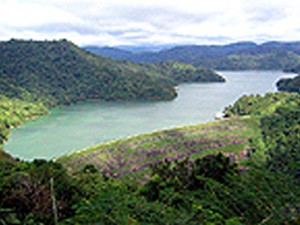MWSS sees private cash pouring in

METRO MANILA’S WATER SUPPLY SOURCE. The Angat Dam in Bulacan is where Metro Manila, home to 12 million residents, sources 97 percent of its water requirements. The Metropolitan Waterworks and Sewerage System says they hope to bid out projects next year that would develop new water sources to boost Metro Manila’s water supply. PHOTO FROM BULACAN.GOV.PH
The Metropolitan Waterworks and Sewerage System (MWSS) expects up to $1 billion from private sector firms that are hoping to bag government contracts to develop new water sources to boost Metro Manila’s water supply.
At the sidelines of the Water Philippines 2011 Expo on Thursday, MWSS chairman Ramon B. Alikpala said the investments would go to the development of more viable water sources over the next three to five years.
“Right now, most of our water comes from one source, so we need to look at alternatives. We have a study now being done by the World Bank. (The study will be) looking at the different possible sources. The World Bank just finished the demand study, which we are validating now,” Alikpala explained. “We’re looking at two issues: one is the supply, but at the same time we’re also looking at security of this supply. It will be difficult to put all your eggs in one basket. What will happen to us if something happens to Angat?”
The ongoing study will identify not only the most viable water resources for Metro Manila over the next few years, but will also look into the more plausible schemes under which projects will be auctioned off, whether through a private-public partnership or an undertaking in which MWSS is expected to take the lead.
According to Alikpala, they expect to receive the complete World Bank study by the middle of October this year, after which they will prepare the necessary requirements for the bidding of projects next year.
At present, Metro Manila, home to 12 million residents, sources 97 percent of its water requirements from the Angat Dam in Bulacan. There have been several bulk water supply proposals and letters of intent that have been put forward by private companies, including the two private water concessionaires—Maynilad Water Services and Manila Water Co. Inc.
The two concessionaires earlier announced that they had mapped out an alternative plan to boost bulk water supply for Metro Manila by developing several low-rise dams tapping multiple watersheds like Laiban, Umiray-Sumag, Marikina and Sierra Madre.
Alikpala said that the MWSS, for now, would put on hold the proposals to develop Wawa, Sierra Madre and Laiban until the completion of the World Bank study.
Interested parties, he said, may participate in the planned bidding next year.
Alikpala admitted that the proposed bulk water supply project would have an impact on the cost of water, but that would depend on how much the project would cost.
“The cost will be spread out over the life of the concession, and the part of the tariff structure already includes an element of that potential bulk source,” he said.
The MWSS earlier estimated a water shortfall of some 1,600 million liters a day by 2015.
